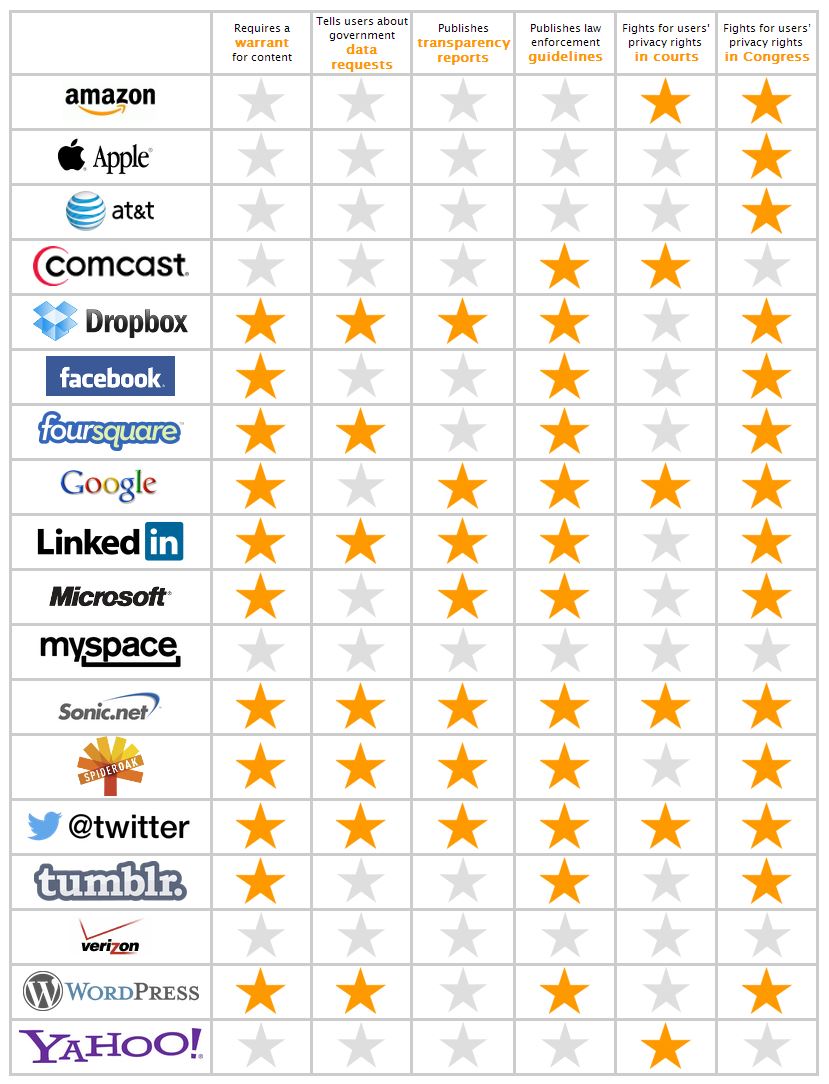EFF Reveals “Who Has Your Back” In Online Privacy

Consumers should trust Twitter, Dropbox, and Google to safeguard their personal information from improper government inquiries, while customers of Apple, AT&T, Myspace, and Verizon should check the street to see if any unmarked government vehicles are parked outside, according to the annual “Who Has Your Back” report from the Electronic Frontier Foundation (EFF), the non-profit digital rights advocacy group. In an evaluation of 18 online firms, a surprising number of prominent companies were found to have few protections for user data against government requests for information.
The EFF’s report examined the publicly available policies of each company and determined their stance on the following criteria 1) warrants for the content of communications, 2) whether users are informed when the government has requested their information, 3) the publication of statistics on government requests for information, 4) the publication of law enforcement guidelines, 5) whether the company has publicly supported user privacy rights in court, and 6) whether the company has publicly supported user privacy rights via the political process.

Only Twitter and California-based ISP Sonic.net received perfect scores in this year’s report, although Google, LinkedIn, and data storage and backup firms SpiderOak and Dropbox all received five out of six.
The EFF notes that the organization has seen measureable improvement each year since the first report in 2011, but that the fight for user privacy in the online arena is still far from over:
While we are pleased by the strides these companies have made over the past couple years, there’s plenty of room for improvement. Amazon holds huge quantities of information as part of its cloud computing services and retail operations, yet does not promise to inform users when their data is sought by the government, produce annual transparency reports, or publish a law enforcement guide. Facebook has yet to publish a transparency report. Yahoo! has a public record of standing up for user privacy in courts, but it hasn’t earned recognition in any of our other categories. Apple and AT&T are members of the Digital Due Process coalition, but don’t observe any of the other best practices we’re measuring. And this year — as in past years — MySpace and Verizon earned no stars in our report. We remain disappointed by the overall poor showing of ISPs like AT&T and Verizon in our best practice categories.
The EFF hopes that the report encourages consumers to take the privacy of their online information more seriously, and put pressure on underperforming companies to change their policies. It’s also part of the organization’s broader strategy to draw attention to government action that threatens online rights and privacy, such as the currently debated Cyber Intelligence Sharing and Protection Act (CISPA).
The full “Who Has Your Back Report” is available now on the EFF’s website, along with detailed descriptions of each criterion and links to the source documents used to evaluate each company. Those interested in the evolution of the report can also view the results from 2011 and 2012.
















